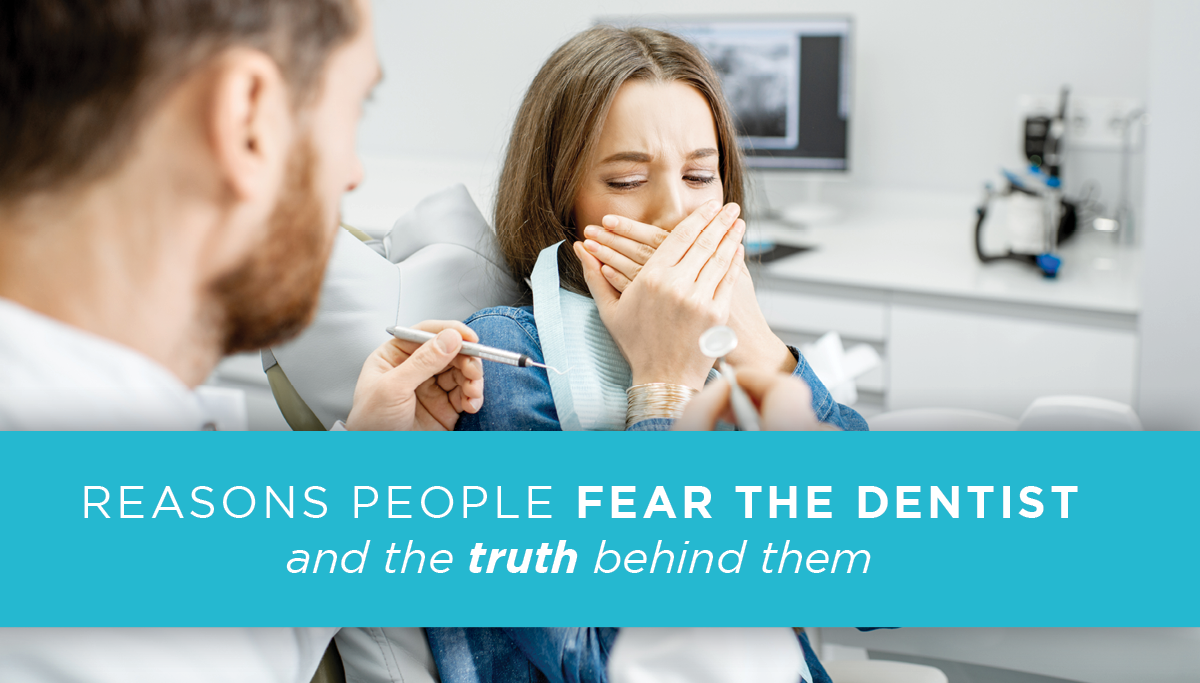Reasons people fear the dentist and the truth behind them
Does the idea of going to the dentist make you nervous? You are not alone! Many people experience dental anxiety before and during dental appointments.
Whether you have a specific or general fear of the dentist, it’s important to recognize it and take the steps to address it to maintain your oral health with the help of dental professionals.
Keep reading to learn about the top reasons people fear the dentist and the truth behind them so you are prepared for your next appointment.
Reasons people fear the dentist
Although there are many reasons people may have dental anxiety, there are six fears that are the most common.
1. Fear of pain
Many people are afraid of experiencing pain during dental visits. If you’re worried about feeling pain during dental procedures, it’s important to remember that your dental team wants you to be comfortable.
Talk with your dental team about your concerns of pain before a procedure begins and let them know if you experience pain at any point during the procedure. Many times, there are options available to keep any pain or anxiety at bay.
The truth: There are many options available when it comes to pain control. Talk to your dentist to decide which options are best for you.
2. Fear of the unknown
Not knowing what to expect during a situation can be scary for anyone, especially at the dentist. If it’s been a while since you’ve had an appointment or need to go in for a procedure you’ve never had before, it’s normal to be nervous!
Talk with your dental team before your cleaning or procedure starts so you know what to expect. Avoid searching online before you go to avoid misinformation. Rely on your dentist’s expertise instead.
The truth: Talk with your dental care team before your cleaning or procedure. They will be able to explain the entire process so there are no surprises.
3. Fear of needles
Another common fear is about the needles that may be used during dental procedures. Needles are often used to inject anesthesia into the gums or other soft tissues in the mouth to numb the area during dental work.
Your dentist may apply a numbing cream before an injection to reduce or prevent any pain. Typically, needles used for dental work are very small and come in a variety of lengths. Only a small portion of the needle will be inserted into the gum or tissue no matter how long it is.
The truth: Some dental work requires injections to numb gums or tissues in the mouth. Talk with your dental team if you have a fear of needles. They will likely numb the area beforehand to ease anxiety.
4. Fear of the dentist
If you have had a negative experience with a dentist in the past, you may have a fear of dentists. Maybe a previous dentist didn’t listen to your concerns or did not take your pain seriously, which is now associated with the idea of dentists.
If you’ve had a bad experience at the dentist, it’s important to not give up and continue to look for a better fit. Picking the perfect dentist for you may take time, but it will be worth it in the end.
The truth: One bad experience with a dentist shouldn’t put your ongoing oral health at risk. Try new dental offices until you find the one that feels right.
5. Fear of gagging
Gagging is never a pleasant experience, but it has a purpose: to keep foreign objects from going to your lungs. Unfortunately, it’s hard for our bodies to tell the difference between a dental tool and a piece of steak.
Dentists and dental hygienists have a lot of experience with gagging and often have solutions to the gagging reflex. They may have you focus on breathing through your nose or encourage you to drool during procedures. If you have a severe gag reflex, there are medications available to stop or reduce it.
The truth: Tell your dentist or hygienist about your concerns about gagging before starting any procedures. They will advise you on what to do to reduce or stop the reflex.
6. Fear of the cost
Another common fear that some people have of the dentist is the bill that comes after the dental work.
The good news is that if you have dental insurance, preventative cleanings are usually 100 percent covered and other dental procedures have a lower out-of-pocket cost. Dental care focuses on preventative measures rather than restorative, meaning that going to regular cleanings can help prevent invasive procedures in the long run. This approach can save you both money and unnecessary pain.
The truth: A dental plan will help reduce out-of-pocket costs, and your dentist can even request a pre-treatment estimate before a procedure so you know what the bill will look like. Most importantly, brush, floss, and visit the dentist regularly to prevent serious dental conditions, which cost more to treat.
The truth behind fears of the dentist
If you have a fear of the dentist, for whatever reason, it’s important to know that there is nearly always a solution to make the entire experience more comfortable. Talk with your dental team openly so that they can provide the best care for your specific needs. Don’t let dental anxiety or dental phobia keep you from having a healthy mouth and smile!
For more tips on how to ease dental anxiety, check out this article.

